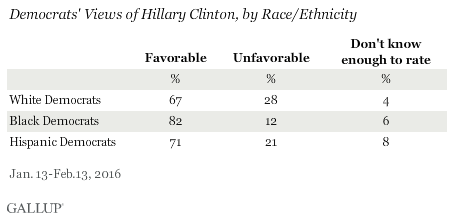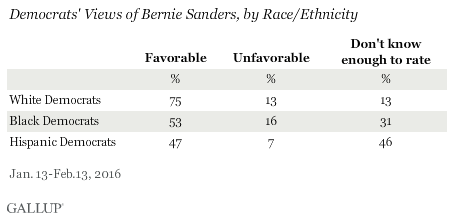
Donald Trump’s supporters are the most likely among Republicans to doubt that President George W. Bush’s policies kept us safe. New polls in Nevada show a runaway race on the GOP side, but a near-tie for Democrats. And Hillary Clinton’s strengths might not be as important as it seems. This is HuffPollster for Wednesday, February 17, 2016.
VOTERS SPLIT ON WHETHER BUSH KEPT AMERICANS SAFE - Morning Consult “In our new national poll, 34 percent of respondents said [President George W.] Bush’s policies kept us safer, while 35 percent said he kept us less safe. Twenty percent of voters said they didn’t think his policies made any impact….And along partisan lines, 57 percent of Republicans said Bush kept us safer, compared to only 19 percent of Democrats. Independents were split on the question: 30 percent said Bush’s policies kept us safe and 32 percent said we were less safe because of them. [Morning Consult]
Trump supporters less likely to think Bush kept us safe - More from Morning Consult: “[Donald] Trump was booed audibly for implying that George W. Bush didn’t keep us safe because of the Sept. 11 attacks, and our polling shows his supporters are much more likely to agree with him than other candidates. Twenty-two percent of Trump supporters say Bush’s policies kept us less safe, compared with just 6 percent of Florida Sen. Marco Rubio’s supporters and 8 percent of Texas Sen. Ted Cruz’s supporters.” [Morning Consult]

NEW CNN/ORC POLL SHOWS TRUMP WITH A MASSIVE LEAD IN NEVADA - Jennifer Agiesta: “The poll finds businessman Donald Trump holding a wide lead, topping the field with the support of 45 percent of those likely to caucus. Florida Sen. Marco Rubio and Texas Sen. Ted Cruz are closely matched in the race for second place, with Rubio at 19 percent and Cruz at 17 percent. Retired neurosurgeon Ben Carson (7 percent), Ohio Gov. John Kasich (5 percent) and former Florida Gov. Jeb Bush (1 percent) lag well behind those three. Nearly 6-in-10 likely GOP caucusgoers say they have definitely decided whom to support, with about one-quarter still trying to make up their minds...Trump is also widely seen as most likely to change the way things work in Washington (64 percent say he's best on that measure), and as the candidate with the best chance of winning in November (56 percent say Trump has the best shot)." [CNN]
CLINTON AND SANDERS TIED IN NEVADA - More from Agiesta: “Likely Democratic caucusgoers in Nevada are split almost evenly between Hillary Clinton and Bernie Sanders ahead of Saturday's caucuses....Overall, 48 percent of likely caucus attendees say they support Clinton, 47 percent Sanders. Both candidates carry their demographic strong points from prior states into Nevada, with Clinton holding an edge among women, while Sanders tops the former secretary of state among voters under age 55. One exception emerges though: Although the pool of potential caucusgoers in Nevada is more racially diverse than those who participated in Iowa or New Hampshire, the racial divide among likely caucusgoers isn't nearly as stark as among voters in South Carolina, with both white and non-white voters about evenly divided between the two candidates.” [CNN]
What to watch for in Nevada - Jon Ralston: "It all comes down to turnout...Most folks I trust on the ground don’t expect turnout to reach six figures again – one insider estimated 70,000 voters. The lower it is, the better for Clinton….If the caucus were just about the current universe of voters, it would be easier to predict and would lean even more toward Clinton. But that is not how it works as the Democrats allow same-day registration….Both campaigns are now calling independents and telling them they can switch to the Democratic Party on Saturday and participate. But how many will do so?...If the turnout is, as the silly Team Clinton spin asserted, 80 percent white, she will lose….Clinton has much more to lose here than Sanders." [Reno Gazette Journal]
CLINTON'S FOREIGN POLICY STRENGTH MAY NOT BE MUCH OF AN ADVANTAGE - HuffPollster: "There's a reason Clinton stresses her foreign policy bona fides: in a new HuffPost/YouGov poll, 59 percent of likely Democratic primary voters say she'd do a very good job of handling foreign policy as president. Just 23 percent say the same of her rival, Vermont Sen. Bernie Sanders (I). But while she holds a significant advantage on the issue, it may prove to be less of an electoral edge than she hopes….[T]he drumbeat of Sanders' attacks seems to be having an effect on some aspects of Clinton's economic credibility….[S]he's still viewed as more likely than not to stand up to Wall Street. But the share of likely Democratic primary voters who think she'd capitulate has risen to 37 percent, compared to just 12 percent who say the same of Sanders." [HuffPost]
CLINTON BETTER-LIKED AMONG BLACK VOTERS BUT SANDERS HAS ROOM TO GROW - Frank Newport: "Democratic presidential candidates Bernie Sanders and Hillary Clinton are actively pursuing the votes of black Democratic caucus and primary voters in Nevada and the key Southern state of South Carolina….Black voters are crucial for Clinton, given that she has a relative image problem among white Democrats. Sanders has a relative image problem among black Democrats nationwide, although some of that is based on the fact that about a third of them do not know him….The two Democratic candidates are also competing for Hispanic voters. This is particularly relevant in Nevada, where Hispanics make up a little less than 28% of the population, although less so in South Carolina, where Hispanics are 5% of the population. Sanders actually has an image advantage over Clinton among Hispanic Democrats in some ways, although he is again deeply handicapped by his lack of name recognition. [Gallup]
MILLENNIALS ARE JUST AS PESSIMISTIC ABOUT THE FUTURE AS PAST GENERATIONS WERE - Samantha Smith: "[Millennials] are the least confident about the nation’s future, just like Generation Xers and Baby Boomers when they were young…. just 37% of Millennials said they had 'quite a lot of confidence' in the future of the United States, compared with 45% of Gen Xers, 49% of Boomers and 56% of the Silent Generation….. In 1994, just 30% of Gen Xers said they had quite a lot of confidence in the future of the U.S. Among older generations at the time – Boomers and Silents – half or more had a lot of confidence in the nation’s future…. In 1975, when Boomers were the youngest generation, 49% had a great deal of confidence in the future of the U.S., compared with 62% of Silents and 67% of the Greatest Generation." [Pew]
HUFFPOLLSTER VIA EMAIL! - You can receive this daily update every weekday morning via email! Just click here, enter your email address, and click "sign up." That's all there is to it (and you can unsubscribe anytime).
WEDNESDAY'S 'OUTLIERS' - Links to the best of news at the intersection of polling, politics and political data:
-Dara Lind finds reason for skepticism about Hillary Clinton's "Latino firewall" in Nevada. [Vox]
-Forty-four percent of Americans had never heard of Supreme Court Justice Antonin Scalia prior to his death. [Gallup]
-Chris Christie's favorability rating in New Jersey hits an all-time low. [Rutgers-Eagleton]
-Jonathan Bernstein says not to worry about superdelegates just yet. [Bloomberg]
-Philip Bump argues that millennial are unlikely to decide the 2016 race. [WashPost]
-Reid Wilson explains how barbeque preference among South Carolina voters might indicate which candidate they'll vote for. [Morning Consult]
Chris Cillizza makes the case for why South Carolina is no longer Bush country. [WashPost]


